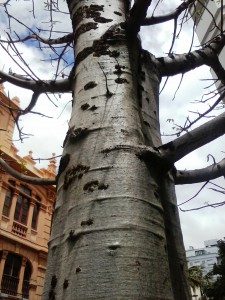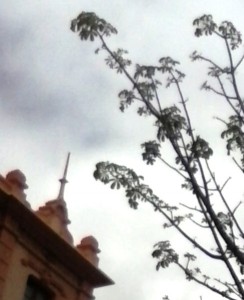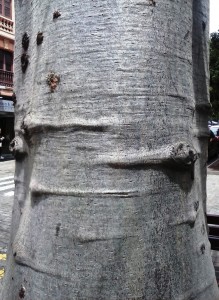New plants at Canarius.com !
- We just uploaded about 120 new products and lots of pictures. More will follow in the next future, before Spring.
- In the next few months before Spring we will add many more plants, especially Crassulaceae, Bromeliads, Epiphytic Cacti, Mesembs, Agave and Aloe. But also some cycads, bromeliads, palms and fruit trees will be added.
——-
List of new species for 2013
First batch: January-February 2013
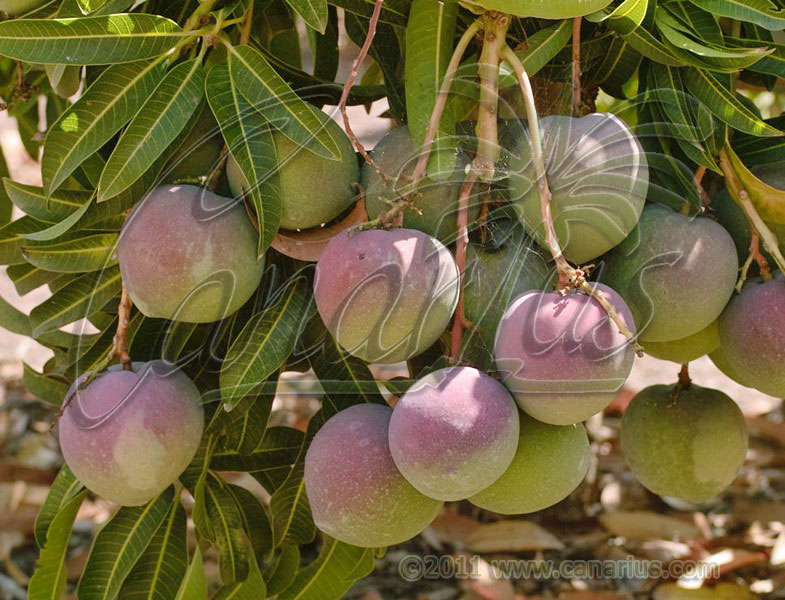
A dwarf Mango named Torbert
- Coccoloba uvifera – Sea Grape, Uva de Mar
- Macadamia tetraphylla – Macadamia Nut Tree
- Mammea americana – Mammee Apple, Mamey Amarillo
- Passiflora mollissima – Curuba, Banana Passion Fruit
- Citrus cv. Bearss – Lima, Lime
- Morus nigra – Black Mulberry, Moral Negro – Small
- Musa cv. Gros Michel – A Banana variety of the past
- Musa cv. Dwarf Cavendish – Dwarf Banana
- Musa cv. Variegated and Extra-Dwarf Bananas (IN SPRING)
- Azadirachta indica – Neem Tree
- Selenicereus megalanthus – Yellow Pitaya, Yellow Dragon Fruit
- Vanilla planifolia – True Vanilla Orchid
- A few new MANGOS: Alphonso, Irwin, Torbert and Mun.
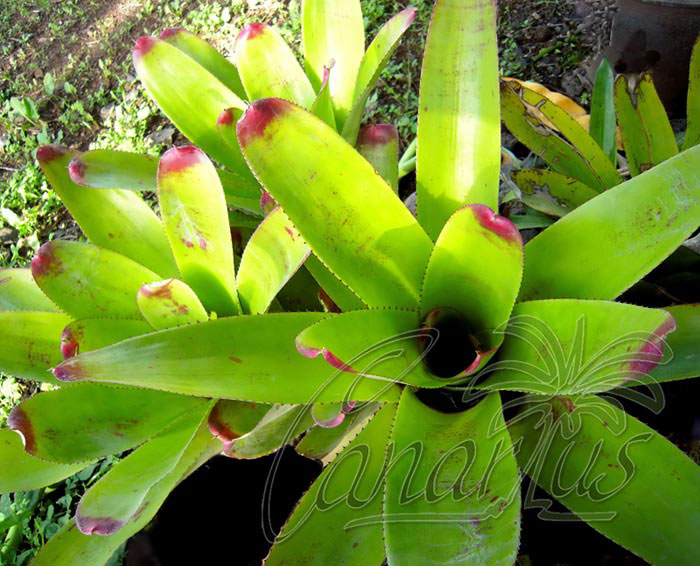
Neoregelia cruenta var. cruenta
- Aechmea recurvata var. benrathii
- Aechmea x Fosters Favorite
- Aechmea bromeliifolia
- Aechmea cylindrata
- Aechmea pimenti-velosoi
- Billbergia vittata Hojas Estrechas
- Bromelia antiacantha
- Deuterocohnia brevifolia ssp. chlorantha
- Hechtia tillandsioides
- Hohenbergia leopoldo-horstii
- Neoregelia cruenta var. cruenta
- Neoregelia kautskii
- Neoregelia marmorata Leme
- Neoregelia x correia-araujoi
- Neoregelia x Fosperior
- Pitcairnia flammea
- Puya mirabilis
- x Cryptbergia Red Burst
 New Mesembs for Early 2013
New Mesembs for Early 2013
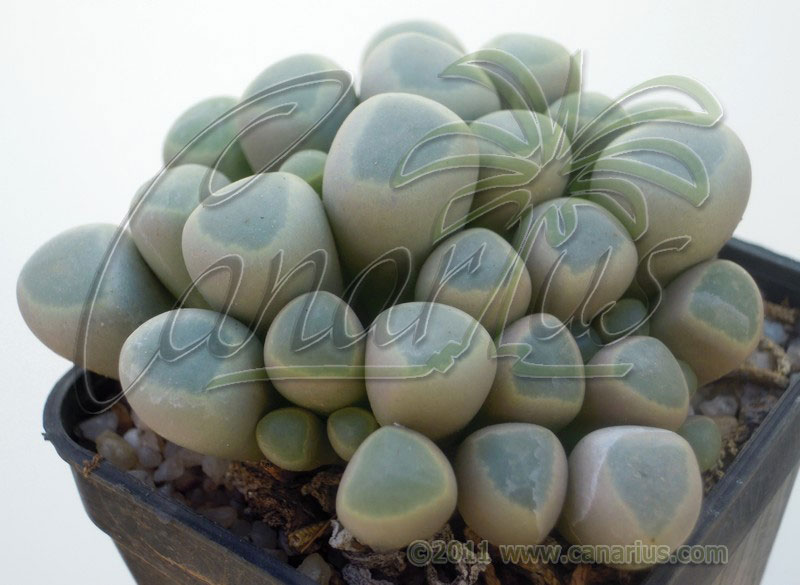
Fenestraria
Nine (9) more species will be added in March !
- Fenestraria rhopalophylla ssp aurantiaca
- Carpobrotus edule
- Carpobrotus mellei
- Malephora crocea
- Ruschia maxima
- Aptenia cordifolia
- Aptenia lancifolia
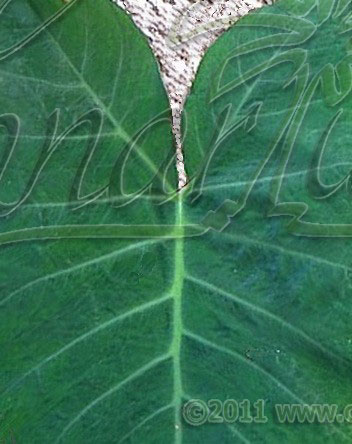
Xanthosoma Leaf
- Azadirachta indica – Neem Tree
- Acalypha – Different Cultivars (Available in SPRING)
- Cattleya x Mariano – (Orchid)
- Colocasia esculenta Ñame Blanco – Taro, Ñame
- Coccoloba uvifera – Sea Grape, Uva de Mar
- Cordyline fruticosa ‘Maui Silver’
- Cordyline fruticosa ‘Bill Durstunis’
- Cordyline fruticosa ‘Haole Girl’
- Cordyline fruticosa ‘Negra’
- Heliconia rostrata
- Ornithogalum caudatum (Bulb)
- Pereskia zinniaeflora – Tree-Cactus
- Plumeria obtusa var. sericifolia – Wild species of Plumeria
- Plumeria cv. Shell Type
- Plumeria cv. Bali Whirl (Double Flowered Plumeria)
- Vanilla planifolia – True Vanilla Orchid
- Xanthosoma saggitifolium - Taro, Malanga
 New Agaves for Early 2013
New Agaves for Early 2013
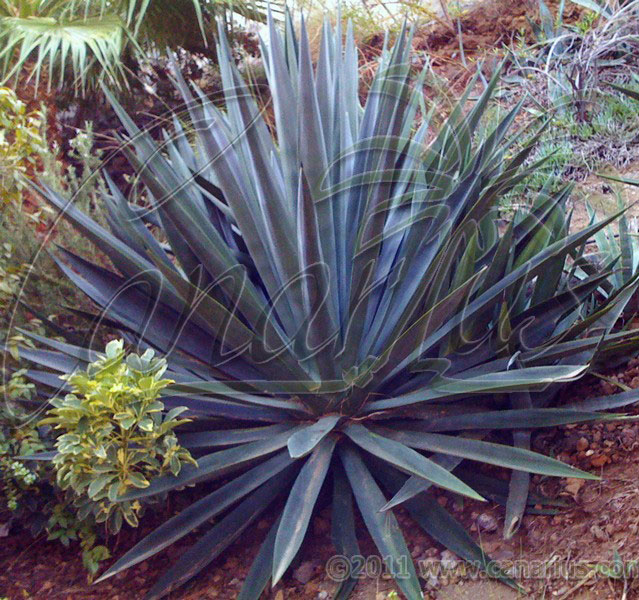
Agave sisalana
Eighteen (18) more species will be added in March !
- Agave triangularis
- Agave spicata
- Agave americana var. expansa -
- Agave beauleriana
- Agave aktites
- Agave americana marginata -
- Agave filifera
- Agave sisalana
- Agave tequilana
- Furcraea selloa marginata
Sixty-two (62) more species more will be added in March !
- X Graptoveria cv Fred Ives -
- Crassula perfoliata var coccinea
- 62 new plants will include popular and rare species, hybrids and variegates !

Sansevieria ehrenbergii
- Sansevieria cylindrica Banded Leaves
- Sansevieria masoniana
- Sansevieria ehrenbergii
- Sansevieria ehrenbergii – Large Plant -
- Sansevieria parva
- Sansevieria trifasciata cv Robusta
- Sansevieria hallii
- Sansevieria francisii
- Sansevieria hyacinthoides
- Sansevieria sp Bally 12681
- Sansevieria stuckyi
- Sansevieria trifasciata cv Golden Hahnii
- Sansevieria trifasciata cv Goldflame
- Sansevieria trifasciata cv Hahnii
- Sansevieria trifasciata cv Hahnii Jade
- Sansevieria trifasciata cv Hahnii Jade Marginata
- Sansevieria trifasciata cv Hahnii Marginata
————————————-
Some Descriptions
Azadirachta indica – Neem Tree
Incredibly useful tree. Its leaves are both an insecticide and a healthy vegetable, widely eaten in Asia. It is very important for ecological agricolture. Leaves and most of its parts can keep many pests under control.Incredibly useful tree. Its leaves are both an insecticide and a healthy vegetable, widely eaten in Asia. It is very important for ecological agricolture. Leaves and most of its parts can keep many pests under control. Buy this plant in www.canarius.com.
Vanilla planifolia – True Vanilla Orchid
This is the real vanilla of your kitchen. It is a climbing orchid that can eventually bloom and set fruits which hold the fabulous aroma. The plant is quite ornamental with opposite, regular leaves. Buy this plant in www.canarius.com.
Macadamia tetraphylla
Excellent Australian nut, able to grow in coastal Mediterranean to Tropical climates. The expensive, sought after nuts are a real delicacy, ripen before Christmas. Macadamia nuts are the only edible crop in the Proteaceae family and also the first modern Australian native food crop. Macadamia nuts contain approximately 86% of monounsaturated fatty acids, known to reduce cholesterol in the blood. The deep green leaves of Macadamia tetraphylla are quite ornamental with serrated margins. Flushes of juvenile foliage are yellow, red or maroon for a while. Buy this plant in www.canarius.com.
Mammea americana – Mammee Apple, Mamey Amarillo
Grafted – Yellow Mamey is a Central American fruit tree with ornamental glossy leaves. The fruit has a brown rough skin. Despite the external appearance it is a sought after fruit with an orange flesh reminicence of an apricot.Yellow Mamey is a Central American fruit tree with glossy ornamental leaves. The fruit has a brown rough skin and despite the external appearance it is a sought after delicacy with an orange flesh reminiscent of an apricot. Mammea americana fruits ripen in autumn. Buy this plant in www.canarius.com.
Passiflora mollissima – Curuba, Banana Passion Fruit
A real beauty with a delicious fruit, from high elevation in the Andes. Passiflora mollissima bears spectacular pink hanging flowers and then yellow long fruits. It is called banana passion fruit because of its shape, not for its flavour. It grows well in cool temperatures but must be protected from frost. Fruits are sweeter than most passifloras but have less juice. Buy this plant in www.canarius.com.
Morus nigra – Black Mulberry, Moral Negro
Deciduous tree native to SW Asia, with excellent dark red flavourful fruits. It is called Black Mulberry in English and Moral Negro in Spanish. Morus nigra is very hardy and stands temperatures below -20 C (-5 F). Buy this plant in www.canarius.com.
Colocasia esculenta Ñame Blanco – Taro, Ñame
Taro is the edible corm of a spectacular plant that can be grown in wet soil or in the water. It has large exotic foliage and produces thick edible corms. This variety named Ñame Blanco is traditionally grown in the Canary Islands. This cultivar named Ñame Blanco is widespread on the islands. Buy this plant in www.canarius.com.
Xanthosoma saggitifolium - Taro, Malanga
Showy plant with large triangular leaves and edible corms, called malanga or taro. Petioles and leaf veins are dark purple. It loves water and can be grown in ponds or buckets as well as in regular pots with damp soil. Buy this plant in www.canarius.com.
Neoregelia kautskii
Beautiful and different. 30 cm rosettes with wide, apple green leaves and blood red bandings. It is native to Espírito Santo in cool Southern Brazil. Green turns golden-yellow in full sun.Beautiful and different. 30 cm rosettes with wide, apple green leaves and blood red bandings. It is native to Espírito Santo in cool Southern Brazil. Green turns golden-yellow in full sun. Buy this plant in www.canarius.com.
Aechmea x Fosters Favorite
Excellent hybrid with hanging dark red inflorescences and Red-maroon leaves. Perfect for hanging baskets. Buy this plant in www.canarius.com.
Pitcairnia flammea
Tall, terrestrial bromeliads with sword like spineless leaves, producing tall spikes of red flowers. It is a good garden plant for mixed borders. Buy this plant in www.canarius.com.
Aechmea winkleri
Medium sized rosette of green leaves, tinged with purple at the tips. Aechmea winkleri produces a pyramidal inflorescences with yellow flowers followed by orange ornamental fruits. lasting three to four months. Native to Southern Brazil, it has some cold-hardiness. Buy this plant in www.canarius.com.
Bromelia antiacantha
Large spiny bromeliad native to Uruguay and South Brazil. Bromelia antiacantha grows to 1-2 m in diameter and eventually produces a spectacular red inflorescence. It is hardy to light, short frosts. Buy this plant in www.canarius.com.
x Cryptbergia Red Burst
Old classic hybrid of Cryptanthus and Billbergia. Its colourful leaves turn glossy cherry red or dull maroon, according to season, light, temperature. Buy this plant in www.canarius.com.
Pereskia zinniaeflora
Pereskias are leafy and spiny trees in the Cactus family. Pereskia zinniaeflora is a Central American and Caribbean species, with pink rose-like flowers. This is the Cuban form and it can be easily grown in pots and kept as a shrub. Buy this plant in www.canarius.com.
Lockhartia lunifera
One of the smallest orchids. Lockhartia lunifera is a choicy species for collectors because of the elegant branches with symmetrical, opposite leaves and the small delicate flowers. Great for the terrarium. We ship a set of three branches of 6-12 cm. Buy this plant in www.canarius.com.
Cattleya x Mariano
Freely-flowering beauties with great scent. Orchid produced by Mariano, an expert orchid hybridizer from Tenerife.Seed sown hybrid produced by Mariano, an expert orchid hybridizer from Tenerife. He mixed wild forms of Cattleya lueddemanniana with a few hybrids and selected an incredible range of freely-flowering beauties with great scent. We ship an almost adult plant, can flower this year or the next Cordyline fruticosa ‘Haole Girl’. Buy this plant in www.canarius.com.
Cordyline fruticosa ‘Haole Girl’
This hawaiian selection of Cordyline fruticosa is named ‘Haole Girl’. It has small sized leaves, mostly green but they develop creamy-white margins and tips at the peak of the growing season. The picture does not do any justice because we took it at the start of new growth. Buy this plant in www.canarius.com.
Cordyline fruticosa ‘Negra’
This hawaiian selection of Cordyline fruticosa is named ‘Negra’. It has large sized, almost black leaves. The whole plant is very erect and robust, up to 4,5 m tall. One of the boldest cultivars. Buy this plant in www.canarius.com.
Azadirachta indica – Neem Tree
Incredibly useful tree. Its leaves are both an insecticide and a healthy vegetable, widely eaten in Asia. It is very important for ecological agricolture. Leaves and most of its parts can keep many pests under control.Incredibly useful tree. Its leaves are both an insecticide and a healthy vegetable, widely eaten in Asia. It is very important for ecological agricolture. Leaves and most of its parts can keep many pests under control. Buy this plant in www.canarius.com.
Vanilla planifolia – True Vanilla Orchid
This is the real vanilla of your kitchen. It is a climbing orchid that can eventually bloom and set fruits which hold the fabulous aroma. The plant is quite ornamental with opposite, regular leaves. Buy this plant in www.canarius.com.
Ornithogalum caudatum
Unsual bulbous plant from South Africa with a showy, glossy green bulb growing above ground, up to 10 cm in diameter. Leaves are pale-gree, long and a produces tall spikes of fragrant flowers. Ornithogalum caudatum is easy growing. It takes hard drought and frost to about -4 C. The bulbs rest , leafless, during the dry summers of the Mediterranean climate, but can rest at any time of the year when water is suspended. Larger bulbs produce bulbils on their sides. Leaves are semi-succulent, drooping and grow to 40-60 cm in length. Inflorescences are produced in summer, as spikes of white fragrant flowers with green, central stripes. Buy this plant in www.canarius.com.
Colocasia esculenta Ñame Blanco – Taro, Ñame
Taro is the edible corm of a spectacular plant that can be grown in wet soil or in the water. It has large exotic foliage and produces thick edible corms. This variety named Ñame Blanco is traditionally grown in the Canary Islands. This cultivar named Ñame Blanco is widespread on the islands. Buy this plant in www.canarius.com.
Xanthosoma saggitifolium - Taro, Malanga
Showy plant with large triangular leaves and edible corms, called malanga or taro. Petioles and leaf veins are dark purple. It loves water and can be grown in ponds or buckets as well as in regular pots with damp soil. Buy this plant in www.canarius.com.
Dozens of species will be added in February
Fenestraria rhopalophylla ssp aurantiaca
A beauty from South Africa. This succulent has unusual leaves with a translucent window on the top, so the core of the leaves can receive light from the the window. This is because the plants can bury themselves underground in extreme drought. It produces beautiful daisy like flowers. Easy to grow, needs a winter rest. We offer a plant grown in a Cont.= 6 cm. Container size will give you an idea, but succulents are often sent bare root. These plants are very tolerant of bare-rooting. Buy this plant in www.canarius.com.
Carpobrotus edule
Carpobrotus edule is an impressive green groundcover with yellow flowers for coastal mediterranean climates. It will make a “lawn” in the harshest sunny areas.Perfect in slopes. We ship two 18-22 cm cuttings. Buy this plant in www.canarius.com.
Malephora crocea
Malephora crocea is a grey leaved succulent ground cover, with remarkable orange-red glossy flowers. It thrives in coastal Mediterranean climates, especially on slopes. It can also be kept in a pot and trimmed back seasonally. We ship three 20 cm cuttings. Buy this plant in www.canarius.com.
Ruschia maxima
Ornamental succulent shrub, 30-100 cm tall, with simmetrical blue leaves with a pink tinge and bright pink flowers. Ruschia maxima is widespread in South Africa and stands frosts, fires and drought. It does well in cultivation , both in gardens or pots. Buy this plant in www.canarius.com.
Carpobrotus mellei
Endemic to the inland mountains in the SW Cape of S Africa, this species blooms easily in pots and does not need to be in the ground.
Carpobrotus mellei is the only mountain carpobrotus and does not need a warm coastal climate. Leaves contains natural antibiotics active
against Staphylococcus aureus and Mycobacterium smegmatis. We offer a plant grown in a 8,5 cm pot. Buy this plant in www.canarius.com.
Aptenia cordifolia
Creeping, fast growing succulent plant with bright pink flowers in summer. Aptenia is the perfect groundcover for gardens in coastal mediterranean climates. We offer four 14-20 cm cuttings. Buy this plant in www.canarius.com.
Aptenia lancifolia
Creeping, fast growing groundcover mesemb with purple flowers in summer. Leaves are smaller than the most common A. cordifolia. We offer four 14-20 cm cuttings. Buy this plant in www.canarius.com.
Agave americana var. expansa -
It is a large grey-blue leaved agave, up to 3 m large. Formerly known as Agave abrupta, it is a cold hardy Agave, widespread in the Canary Islands and some Mediterranean countries. Canarius will ship a plant of 14-18 cm, bare rooted. Buy this plant in www.canarius.com.
Agave beauleriana
Agave beauleriana has one of the best blue colours in the genus Agave. A powdery white-blue ! This species was formerly known as Agave franzosinii. It becomes a large plant, eventually reaching 2-3 m in diameter. Cold hardy to around -9 C (15 F). Canarius will ship a plant of 14-18 cm, bare rooted. Buy this plant in www.canarius.com.
Agave aktites
Native to coastal areas of N Mexico, in the states of Sonora and Sinaloa. It has straight blue leaves and bears a viviparous inflorescence attaining 2,5-3 m. Hardy to -18 C (0 F) Canarius will ship a plant of 14-18 cm, bare rooted. Buy this plant in www.canarius.com.
Agave americana marginata -
This “marginated” agave is an old classic of Mediterranean gardens. Leaves are dark green with creamy-yellow margins and will often bend and twist gracefullly. Canarius will ship a plant of 14-18 cm, bare rooted. Buy this plant in www.canarius.com.
Agave filifera
Compact species, widespread in central Mexico where it grows at high elevations. It forms a dense, solitary rosette with typical white “hairs” on the leaves. It tolerates dry frost. Canarius will ship a plant of 14-18 cm, bare rooted. Buy this plant in www.canarius.com.
Agave sisalana
This is a millenary crop plant grown for fibres named sisal. It originated in Mexico, Chiapas, and is widely cultivated elsewhere. It is probably a sterile cultivar derived from A. vivipara. Canarius will ship a plant of 14-18 cm, bare rooted. Buy this plant in www.canarius.com.
Agave tequilana
The famous tekila drink is produced with this species with grey-blue leaves. It is only known in cultivation, and was never found in the wild, but it was possibly originally native to Jalisco in Mexico. It is a large plant with straight grey-blue leaves. Canarius will ship a plant of 14-18 cm, bare rooted. Buy this plant in www.canarius.com.
Agave triangularis
It has olive-green leaves, finely asperous, with a broad paler band running down the center. It is native to an arid calcareous region in Teuhuacan, Puebla in Mexico, at 1650 to 1950 m elevation. It is a slow growing Agave, attaining 50-80 cm in diameter. It stays small forever if kept in a small container. Hardy to about -6 C (21 F). Buy this plant in www.canarius.com.
Agave spicata
Agave spicata does not have the typical appearance of an agave and reminds a Manfreda or Yucca. Leaves have a soft end spine and are toothless, with a green-blue colour and the so called bloodspots, nice blotches typical of the genus Manfreda. It is easy in cultivation and takes only five or six years to flower. Agave spicata was known until 1995 as Agave yuccaefolia and now it is still placed in the monotypic section Yuccafoliae. The original description was in 1802 by Cavanilles from the botanical garden of Madrid. Buy this plant in www.canarius.com.
Furcraea selloa marginata
This plant usually grows an aerial trunk of 0,5-2 m and then an incredibly tall inflorescence. It can be grown in a pot for years and it will keep a size and probably never flower. Canarius will ship a plant of 14-18 cm, bare rooted. Buy this plant in www.canarius.com.
Dozens of species will be added in February
Marniera chrysocardium
A cactus branch resembling a palm leaf. This is a majestic spineless epiphytic cactus, with flat winged branches. It has a spreading and drooping habit. Beautiful large flowers. Buy this plant in www.canarius.com.
Aporophyllum x Myrna Corbet
Aporophyllum x Myrna Corbet is an excellent hybrid with salmon coloured flowers, orange-pink. We ship a plant in a pot: 10,5 cm, a Well Branched Adult, about 15 cm long. This plant will flower next spring. Buy this plant in www.canarius.com.
Epiphyllum anguliger
Epiphytic cactus with a truly unusual shape. We offer a plant of the following size: Cutting 18-22 cm. These plants are very easy to root in a draining soil mix. Buy this plant in www.canarius.com.
Cryptocereus anthonyanus
Epiphytic cactus with an extraordinary shape. Very ornamental, zig-zag arching branches, almost spineless, perfect for hanging pots. Large flowers in late spring. Cryptocereus anthonyanus bears large flowers in late spring. It grows well in bright shade and can be placed indoors in a sunny-oriented room. Keep above 6 C (43 F). We offer a plant of the following size: Cutting 18-22 cm. These plants are very easy to root in a draining soil mix. Buy this plant in www.canarius.com.
Dozens of species will be added in February
Crassula perfoliata var coccinea
South african crassula with showy bright red flowers. Crassula perfoliata var coccinea has erect stems, 20-50 cm tall, with regular, straight leaves apple-green to blueish-gray. Hardy to – 6 C (21 F). We ship a 14-18 cm cutting. Buy this plant in www.canarius.com.
X Graptoveria cv Fred Ives
Great hybrid developed by A. Baynes in 1946 by crossing Graptopetalum paraguayense with a type of Echeveria gibbiflora. The result is this easy growing, elegant plant with jade and purple colours and a height. It takes light frosts. We ship a cutting consisting of one adult rosette. Buy this plant in www.canarius.com.
Sansevieria sp Bally 12681
Miniature creeper with spiky tight rosettes. Surely the smallest and the cutest of all the species! Compared to a typical Sansevieria ballyi, this S. ballyi 12681 has longer leaves, lighter coloured, with widely spaced dark green cross-banding and channels that only go half way up the leaf. It slowly spreads by stolons. It was also known as S.ballyi “Minnie”. Sansevieria sp Bally 12681 has tiny rosettes of conical, stiff, 5 cm long leaves, with a spiny tip. They grow at the end of long, rigid, above ground stolons. Good for hanging baskets. An easy and fast growing plant. Collected in Kenia by P.R.O.Bally. We offer a single mature rosettes 5cm diameter. Buy this plant in www.canarius.com.
Sansevieria stuckyi -
The largest species of the genus. Smooth, dark green 1,50-2m. tall cylindrical single leaved shoots, growing from a creeping rhizome. Sansevieria stuckyi easily grows in any kind of well drained soil and slowly multiplies to create a huge, thick mass of leaves. In summer a short rounded spike of white, scented flowers sprouts at the base of the mature leaves. Sansevieria stucky grows well in half shade and it is a new and showy addition to indoor landscaping plants. Suitable for Mediterranean gardens , too. Native to Mozambique. We offer a young single leaf with rhizome, 30-40cm. tall. Buy this plant in www.canarius.com.
Sansevieria cylindrica Banded Leaves
Large head with leaves of 30-40 cm -This species has cylindrical smooth leaves with a green-gray banding. Old plants in the ground can reach 1-2 m in height.This species has cylindrical smooth leaves with a green-gray banding. Sansevieria cylindrica has recently become a popular houseplant, but old plants in the ground can reach 1-2 m in height. We ship a large head with leaves of 30-40 cm. Buy this plant in www.canarius.com.
Sansevieria masoniana
Elegant sansevieria with large wide erect mottled leaves. It is native to Zaire and was described in the year 2000. Single or paired leaves rise from a thick, underground rhizome.Sansevieria masoniana was previously known as “S. sp.Mason Congo” it is a striking plant with extra large, leathery, oval leaves, up to 1m tall, 25cm. wide. Single or paired leaves rise from a thick, underground rhizome. They are deep green, splashed with light green, round blotches. This species needs plenty of room to properly develop its huge, paddle like leaves. As suggested by its old name, it comes from Congo, and therefore should be treated as a tropical plant. When cultivated in full light the leaves tend to grow shorter and rounded as a tea saucer. Buy this plant in www.canarius.com.
Sansevieria ehrenbergii Salaf form from Yemen
Spectacular fan-shaped succulent with distichously arranged thick leaves, of a bright blue-green. Seldom offered for sale. Sansevieria ehrenbergii is a slow growing, impressive species with fan-shaped clumps of up to 10 spear like, rigid leaves. Sansevieria ehrenbergii is a widespread species and Canarius here offers the “Salaf” form from Yemen. Described in 1875, its habitat ranges from East Africa to Southern Arabia. Straight, very long leaves arranged in two rows on a short stem. They are channeled above, smooth and uniformly green. The inflorescence is branched, covered with hundreds of tiny white, scented flowers. A slow growing species adapted to extremely hot and arid lands. Buy this plant in www.canarius.com.
Sansevieria francisii
Sansevieria francisii is a slow but easy growing species, with conical, 10cm. long leaves, stacked on a short stem in rows of five and tipped with a fierce spine, gracefully cross banded. Best known as “S. sp. FKH 432” was collected in Kenia by Frank Horwood in 1982 and described as a new species by B.J.Chahinian in 1995.Free flowering, suitable for baskets. We ship: plantlets with own roots in 6cm.pot. Buy this plant in www.canarius.com.
Sansevieria hyacinthoides
Sansevieria hyacinthoides looks like a larger trifasciata, having wider (8-10cm.) and taller (1.50 m.) leaves, marked with pale green spots. This is a most vigorous species, widely distributed in the central and southern regions of Africa. The leaves are flat, erect, lanceolate, deep green in color, with a pattern of irregular light green blotches , which form irregular cross bands. Its leaves have a typical , thin, reddish, dry margin. A tropical species which likes full shade. It was the earliest species of Sansevieria to be cultivated in Europe: described and illustrated by J.Commelijn in Amsterdam back in 1703.We ship big shoots, 50-60cm tall Buy this plant in www.canarius.com.
Sansevieria parva
“Parva” means “small”, and this is a tiny stoloniferous species, eventually forming a carpet or filling a hanging basket. It freely shoots aerial
rhizomes, each one tipped with a new plantlet. Easy and fast growing, a perfect species for hanging baskets. Rosettes have 10-20 narrow, thin glossy leaves, about 30 cm long and 2 cm wide, covered with alternating dark and light green cross bands. An easy flowering species with showy spikes of white, scented flowers. Sansevieria parva was described in Kew Gardens in 1915, it is native to cooler mountains of Rwanda, Uganda and Kenya, it is probably the hardiest of the Sansevieria and can take cool temperatures and light,
short frosts. Buy this plant in www.canarius.com.
Sansevieria trifasciata cv Robusta
An old classic in sansevierias, with mid-sized, glossy leaves with a green and grey banded pattern. Buy this plant in www.canarius.com.
Sansevieria hallii
A curious plant also called “Baseball Bat”. The nickname aptly describes the unusual look of its leaves. From a short underground rhizome grow single tubular leaves, dull green, up to 3cm. thick, 30cm. long, arching backward, channeled above. Conspicuous inflorescences of 8cm. long, white flowers, pop out at soil level, at the base of a leaf. Easy, but very slow growing: a rare collector’s plant. It comes from Mozambique, where it grows up to 1m. tall. Buy this plant in www.canarius.com.
Sansevieria trifasciata cv Golden Hahnii
Thin, small, yellow, semi translucent leaves with a wide, central, green longitudinal band. The size and the arrangement of yellow and green bands is variable so that each leaf has its unique pattern. Its ample variegation makes this plant the most delicate of the series: better grown indoor in a warm, bright place all year round. Thrives under adequate artificial lighting.
We offer robust plants grown in 8-10 cm pot size, bare rooted. Buy this plant in www.canarius.com.
Sansevieria trifasciata cv Goldflame
Wonderful, new cultivar showing a unique type of variegation: the plant looks as painted with brilliant creamy-golden enamel. The most brightly coloured of all the trifasciata cultivars. It grows in a ‘tulip shaped’ rosettes of thick, 30 cm long, arching leaves. The outer leaves resemble the cv.Futura, the inner leaves are entirely covered with brushstrokes of a shiny golden layer the “flaming” on each leaf is different than from the others. We offer: Mature plants 30 cm tall, 12 cm pot size, bare-rooted. Buy this plant in www.canarius.com.
Sansevieria trifasciata cv Hahnii
It is a dwarf form of S. trifasciata, not reaching 15 cm of height. Small, tight rosettes of erect, oval, dark green leaves, cross banded with silver stripes. This unique mutation was discovered in 1939 in a nursery of New Orleans and was patented with its actual name by Sylvan Hahn of Pittsburgh in 1941. Despite its diminutive look it is as hardy as its “mother” S. trifasciata. Freely offsetting dislikes damp soil and strong sunshine. The sterile flowers are rarely seen. Better indoor when temperatures fall below 10 C. From this cultivar, a series of new attractive sports originated.
We offer robust plants grown in 8-10 cm pot size, bare rooted. Buy this plant in www.canarius.com.
Sansevieria trifasciata cv Hahnii Jade
Same as “Hahnii Jade” but with the striking presence of a rich yellow margin making a perfect contrast with the deep green shiny leaves. We offer robust plants grown in 8-10 cm pot size, bare rooted. Buy this plant in www.canarius.com.
Sansevieria trifasciata cv Hahnii Jade Marginata
A “Hahnii” lacking any silvery spot or stripes. Miniature rosettes of dark green, glossy leaves. Uncommon , new addition to the Hahnii series.
We offer robust plants grown in 8-10 cm pot size, bare rooted. Buy this plant in www.canarius.com.
Sansevieria trifasciata cv Hahnii Marginata
This ”Hahnii” has a thin yellow leaf margin. Rosettes are smaller and tighter than typical “Hahnii”. It thrives in partial shade, keep warm and dry in winter. We offer robust plants grown in 8-10 cm pot size, bare rooted. Buy this plant in www.canarius.com.

















